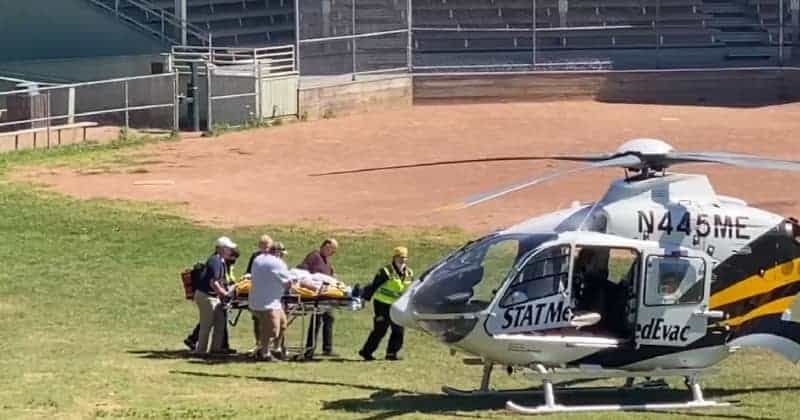
AFP

New York (AFP) – British author Salman Rushdie, whose writings have made him the target of Iranian death threats, underwent emergency surgery Friday after being repeatedly stabbed in the neck at a literary event in New York state.
Rushdie was rushed by helicopter to hospital and taken into surgery, his agent Andrew Wylie said in a statement, pledging to provide an update on his condition as soon as possible.
Social media footage showed people administering emergency medical care onstage immediately after the attack. The interviewer also suffered a head injury.
A suspect was taken into custody by police, who gave no immediate details about his identity or probable motive.
The attack occurred at the Chautauqua Institution, which hosts arts programs in a tranquil lakeside community 70 miles (110 kilometers) south of Buffalo city.
Carl LeVan, an American University politics professor attending the event, told AFP that the morning session was about to begin when the suspect ran onto the stage where Rushdie was seated and “stabbed him repeatedly and viciously.”
LeVan, a Chautauqua regular, said the suspect “was trying to stab him as many times as possible before he was subdued,” adding that he believed the man “was trying to kill” Rushdie.”
“There were gasps of horror and panic from the crowd,” the professor said.
LeVan said witnessing the event had left him “shaken,” adding he considered Chautauqua a safe place of creative freedom.
“To know that this happened here, and to see it — it was horrific,” he said. “What I saw today was the essence of intolerance.”
Another witness, John Stein, told ABC that the assailant “started stabbing on the right side of the head, of the neck. And there was blood… erupting.
“People in the audience had gotten up on the stage when they saw this and then grabbed the attacker who still had a knife.”
A decade in hiding
Rushdie, 75, was propelled into the spotlight with his second novel “Midnight’s Children” in 1981, which won international praise and Britain’s prestigious Booker Prize for its portrayal of post-independence India.
But his 1988 book “The Satanic Verses” brought attention beyond his imagination when it sparked a fatwa, or religious decree, calling for his death by Iranian revolutionary leader Ayatollah Ruhollah Khomeini.
The novel was considered by some Muslims as disrespectful of the Prophet Mohammed.
Rushdie, who was born in India to non-practicing Muslims and today identifies as an atheist, was forced to go underground as a bounty was put on his head — which remains today.
He was granted police protection by the government in Britain, where he was at school and where he made his home, following the murder or attempted murder of his translators and publishers.
He spent nearly a decade in hiding, moving houses repeatedly and being unable to tell his children where he lived.
Rushdie only began to emerge from his life on the run in the late 1990s after Iran in 1998 said it would not support his assassination.
Now living in New York, he is an advocate of freedom of speech, notably launching a strong defense of French satirical magazine Charlie Hebdo after its staff were gunned down by Islamists in Paris in 2015.
The magazine had published drawings of Mohammed that drew furious reactions from Muslims worldwide.
An ‘essential voice’
Threats and boycotts continue against literary events that Rushdie attends, and his knighthood in 2007 sparked protests in Iran and Pakistan, where a government minister said the honor justified suicide bombings.
The fatwa failed to stifle Rushdie’s writing and inspired his memoir “Joseph Anton,” named after his alias while in hiding and written in the third person.
“Midnight’s Children” — which runs to more than 600 pages — has been adapted for the stage and silver screen, and his books have been translated into more than 40 languages.
Suzanne Nossel, head of the PEN America organization, said the free speech advocacy group was “reeling from shock and horror.”
“Just hours before the attack, on Friday morning, Salman had emailed me to help with placements for Ukrainian writers in need of safe refuge from the grave perils they face,” Nossel said in a statement.
“Our thoughts and passions now lie with our dauntless Salman, wishing him a full and speedy recovery. We hope and believe fervently that his essential voice cannot and will not be silenced.”


Recommended Comments
There are no comments to display.